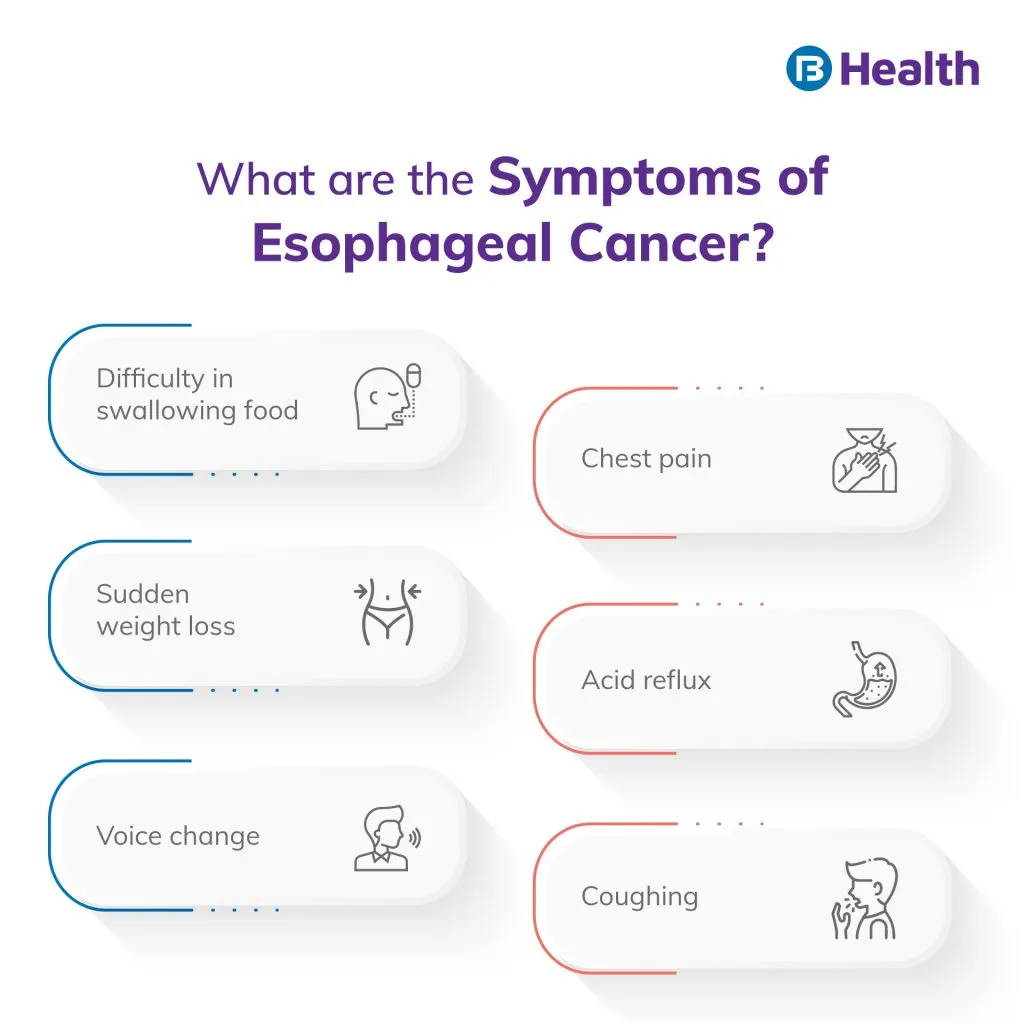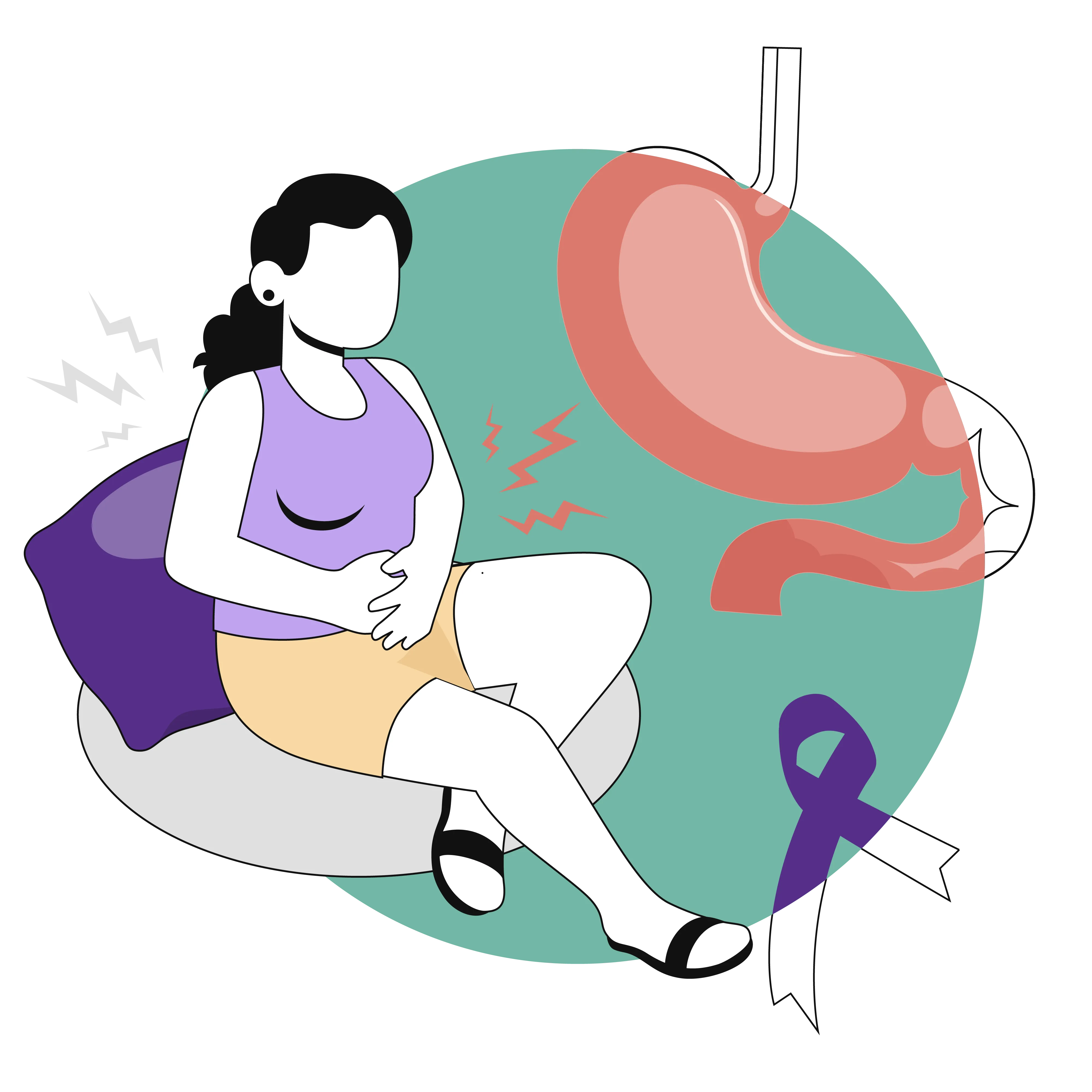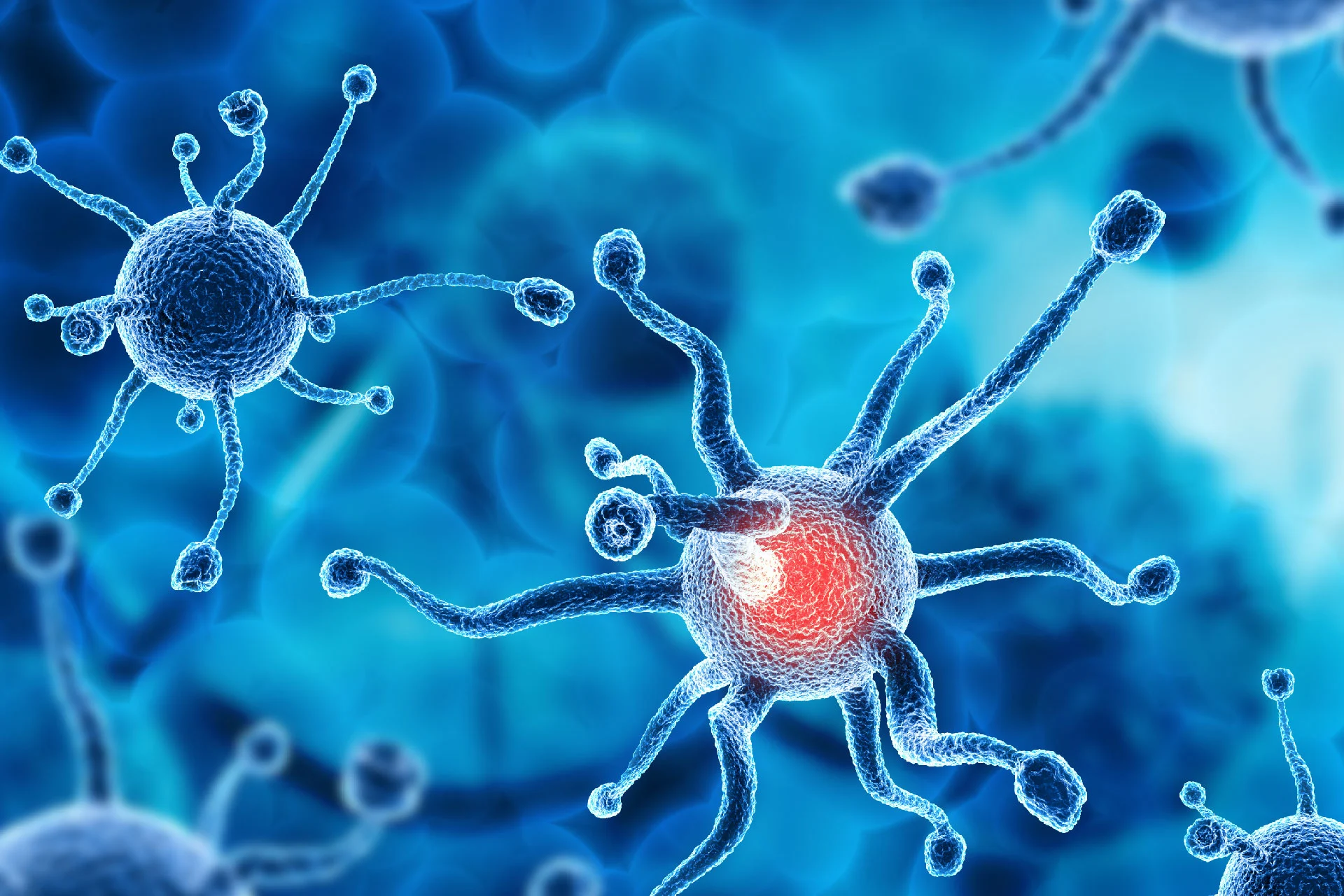Cancer | 8 min read
What is Esophageal Cancer? Know Everything About It!
Medically reviewed by
Table of Content
Synopsis
A malignant growth can develop in the esophagus lining, leading to esophageal cancer. The muscle and deep tissues of the esophagus may be affected when the tumor spreads. Healthcare professionals might be able to remove the cancer with surgery and other therapies if it is found early.
Key Takeaways
- The esophagus is where esophageal cancer first appears
- Typically, symptoms don't become evident until the cancer has advanced
- In the absence of a cure, researchers concentrate on improving quality of life
What is Esophageal Cancer?
A malignant tumor of the esophagus is referred to as esophageal cancer. The esophagus is a long, muscular tube that carries food from your neck to your stomach. It begins in the tissues of the esophagus. Esophageal cancer tumors sometimes don't show symptoms until the malignancy has spread. The muscle and deep tissues of the esophagus can also be affected when the tumor spreads. A tumor can develop anywhere along the esophagus' length.
What causes Esophageal Cancer?
As with the majority of cancers, the exact cause of esophageal cancer is still unknown. It is thought that it has something to do with abnormalities (mutations) in the DNA of the cells that make up the esophagus. These changes signal the cells to divide more quickly than healthy ones would.
Additionally, these mutations interfere with the signal that tells these cells when to die. As a result, they build up and develop into tumors.
According to experts, irritation in the esophagus promotes cancer growth [1]. Some practices and circumstances that may cause the irritation include:
- Tobacco usage: This includes smoking as well as the use of tobacco
- Alcohol use: Drinking alcohol frequently or heavily raises the risk of esophageal cancer
- Obesity: Being overweight or obese might lead to esophageal inflammation that could progress to cancer
- Chronic acid reflux and Barrett's esophagus: Chronic untreated acid reflux causes a change in the cells at the lower end of your esophagus, resulting in Barrett's esophagus. People who experience chronic heartburn have an increased risk of esophageal cancer even if they don't have Barrett's esophagus
- Human papillomavirus (HPV): HPV is a widespread virus that can affect tissue changes in the vocal cords and mouth, as well as on the hands, feet, and genitals
- Cancer history: People who have had neck or head cancer are more likely to develop esophageal cancer
- Other illnesses: A few uncommon or hereditary diseases have been associated with esophageal cancer. One of them is achalasia, a rare condition that makes it difficult to swallow. Tylosis is another rare genetic condition where extra skin develops on the palms of your hands and the soles of your feet
- Workplace exposure to specific chemicals: People who are exposed to dry cleaning chemicals over an extended period of time are more likely to acquire esophageal cancer
Additional Read: Blood Cancer Awareness Month: When and How is it Observed?

Symptoms
During the early stages of this malignancy, people frequently show no symptoms. As a result, most esophageal cancer diagnoses take place after the disease has progressed.
These signs and symptoms could be present:
- Dysphagia: It is harder to swallow food as the esophageal tube narrows due to the tumor. This is typically the first observable symptom.
- Vomiting: When food becomes lodged in the esophagus, the person vomits it up
- Weight loss: Sudden, dramatic weight reduction is possible
- Coughing: This happens more frequently when swallowing. The person may occasionally cough up blood
- Voice changes: The voice could become hoarse
- Pain and discomfort: The tissue in the throat feels painful and uncomfortable
- Acid reflux: This condition may occur if cancer has spread to the esophagus's lower region
- Chest pain: This is caused by acid reflux
Treatment
The approaches a physician will employ to treat esophageal cancer rely on a number of factors, including:
- Cancer of the cellular type
- Esophageal cancer staging
- The age and overall well-being of the esophageal cancer patient
- The existence of other illnesses
Options for treatment include:
- Surgery
- Chemotherapy
- Radiotherapy
In order to eat and drink, the individual may require assistance in the following ways:
- If the patient is unable to swallow, a surgeon may place a stent to keep the esophagus clear
- A nasogastric tube, inserted by a surgeon through the nose, can be required to help with feeding with ongoing tumor therapy
- A gastrostomy is a feeding incision that gives access to the stomach directly through the skin
Either the whole tumor and any further malignant cells are removed during treatment, or the tumor is kept from growing any larger. A doctor could advise surgery, chemotherapy, or perhaps both for the most advanced stage 4 esophageal cancer.
Surgery
People with esophageal cancer may benefit from the following surgical procedures:
- Esophagectomy: A portion of the esophagus is removed during this treatment. The surgeon cuts off the tumor-containing portion of the esophagus and rejoins the remaining tissue to the stomach. They may employ a tiny segment of the large intestine to link the esophagus to the stomach.
- Esophagogastrectomy: During this surgery, the surgeon removes the tumor-bearing section of the esophagus, some of the stomach's contents, and adjacent lymph nodes.
Other techniques
There are several non-surgical methods for treating esophageal cancer, such as:
- Photodynamic therapy: The physician injects the esophageal cell with a particular chemical that increases the cell's sensitivity to light. The surgeon burns cancer cells with a laser-equipped endoscope to eradicate them.
- Chemotherapy: This treatment option may be used in combination with radiation therapy and may be administered either before or after surgery. Chemotherapy can relieve symptoms of advanced cancer, delay or prevent a recurrence, and reduce the growth of the disease.
- Radiation therapy: Cancer cells are eliminated by high-energy X-ray, particle, or radiation beams. Radiation treatment alters the DNA of tumor cells, rendering them incapable of procreating. Radiation therapy can be administered either internally with brachytherapy or externally with external beam radiation by a physician. Radiation treatment is frequently used with chemotherapy for people with esophageal cancer. Oncologists may prescribe radiation treatment either before or after surgery.
Additional Read: Bone Cancer: Symptoms, Causes, Diagnosis, and Types

Diagnosis
A doctor will check symptoms and inquire about their problems when a patient shows symptoms. Then, they might recommend the person to an expert.
The doctor will prescribe the following diagnostic tests
Gastroscopy, or Endoscopy
During this procedure, a doctor inserts an endoscope, a long, thin device, into the mouth, esophagus, and stomach. A light and camera are located at the end of the endoscope. The doctor examines the photos on a screen to check for tumors or other abnormalities.
Biopsy
If the endoscopy yields unexpected results, the doctor may extract a sample of tissue. The material is subsequently examined under a microscope by a pathologist. They are able to identify the presence of malignant cells.
Barium Swallow Test
The patient consumes a barium-containing liquid. X-rays reveal the presence of barium. A technician periodically captures a number of x-ray images. They'll show any waning obstructions that a tumor could produce.
Endoscopic Ultrasound
An endoscope is attached to a tiny ultrasound probe. Then, the physician places it via the mouth into the target position. This generally happens after the doctor has determined that the patient has cancer but wants a closer look at the tumor on a monitor. If cancer has spread to the surrounding tissue, this kind of test could reveal it.
Other Imaging Scans
A CT scan can help assess how far cancer has spread.
Complications
Complications brought on by esophageal cancer include:
- Esophageal obstruction: The esophagus may not be able to move food and liquids properly if you have cancer
- Pain: There may be discomfort from advanced esophageal cancer
- Esophageal bleeding: Bleeding can be caused by esophageal cancer. Even though bleeding occurs gradually, it can occasionally be abrupt and severe
Types
The types of cells involved in esophageal cancer are classified into different types. Your esophageal cancer treatment options are influenced by the type of esophageal cancer you have. Esophageal cancer is of the following types:
Adenocarcinoma
The cells of the mucus-secreting glands in the esophagus are where adenocarcinoma develops. The lower part of the esophagus is where adenocarcinoma most frequently occurs.
Squamous Cell Cancer
The lining of the esophagus is covered in flat, thin cells called squamous cells. Most frequently, squamous cell carcinoma develops in the upper and middle esophagus. Globally, squamous cell carcinoma is the most common esophageal cancer. If you want to protect yourself from Esophageal cancer you can avail cancer insuranceOther Uncommon Kinds
Small cell carcinoma, sarcoma, lymphoma, melanoma, and choriocarcinoma are some examples of uncommon esophageal cancers.
The eighth most prevalent cancer in the world is esophageal cancer [2]. One of the hardest malignancies to cure is this one. Because of the esophageal cancer symptoms it creates, people might not become aware of them until the disease has already spread. For esophageal cancer, there is no treatment. In that case, healthcare professionals focus on providing patients with the finest care possible so that they can live as long as possible. Being informed that you are ill and there is no treatment is one of life's most challenging experiences. You might need some time and support to accept your circumstances. Cancer specialists from Bajaj Finserv Health are aware of this and will take all reasonable steps to assist you, including suggesting that you talk with a mental health professional. Getting a doctor consultation or an oncologist consultation will not only help you know more about esophageal cancer, but you can also know about other common types of cancers, such as stomach cancer, bone cancer, etc.
References
- http://www.bmrat.org/index.php/BMRAT/article/view/460#:~:text=Esophageal%20cancer%20(EC)%20is%20the,cancer%20in%20the%20world%201.
Disclaimer
Please note that this article is solely meant for informational purposes and Bajaj Finserv Health Limited (“BFHL”) does not shoulder any responsibility of the views/advice/information expressed/given by the writer/reviewer/originator. This article should not be considered as a substitute for any medical advice, diagnosis or treatment. Always consult with your trusted physician/qualified healthcare professional to evaluate your medical condition. The above article has been reviewed by a qualified doctor and BFHL is not responsible for any damages for any information or services provided by any third party.





